高中英语人教版选修七Unit 5 Travelling abroad Period Three Grammar & Writing课件(35张)
文档属性
| 名称 | 高中英语人教版选修七Unit 5 Travelling abroad Period Three Grammar & Writing课件(35张) |  | |
| 格式 | zip | ||
| 文件大小 | 1.2MB | ||
| 资源类型 | 教案 | ||
| 版本资源 | 人教版(新课程标准) | ||
| 科目 | 英语 | ||
| 更新时间 | 2019-03-27 09:30:18 | ||
图片预览

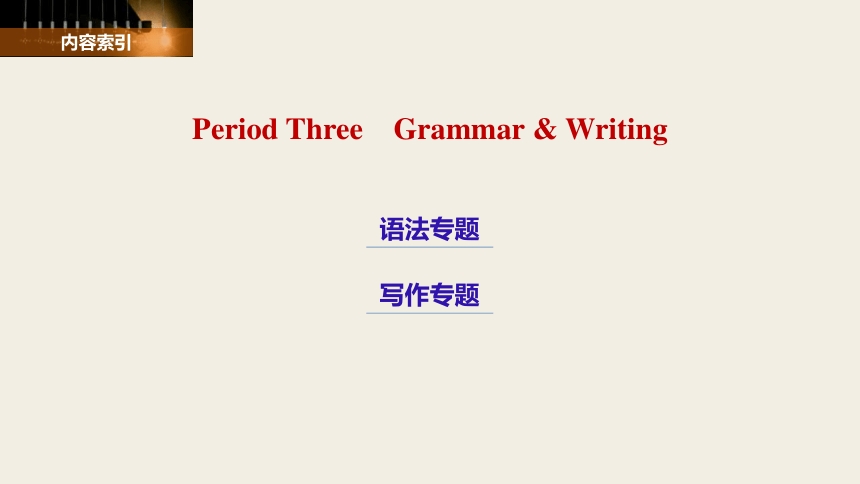

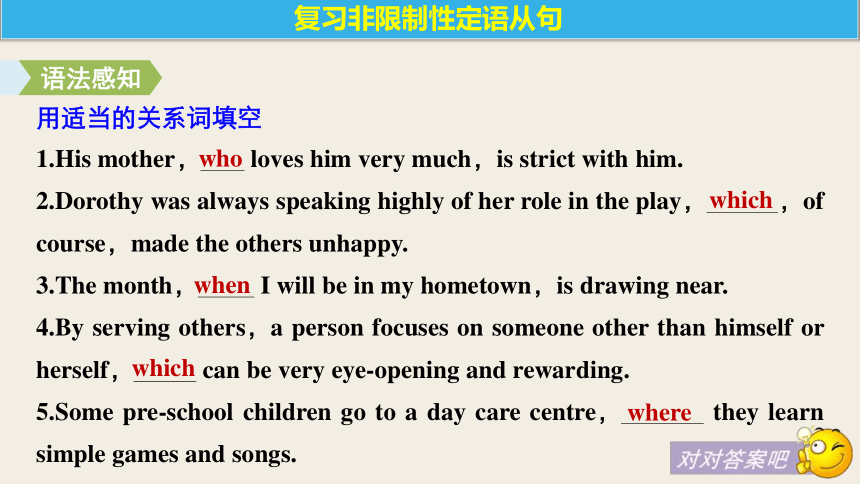

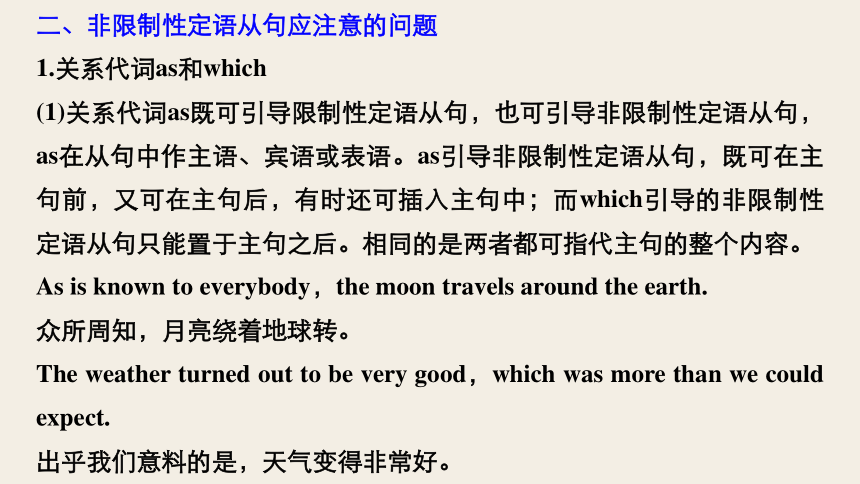
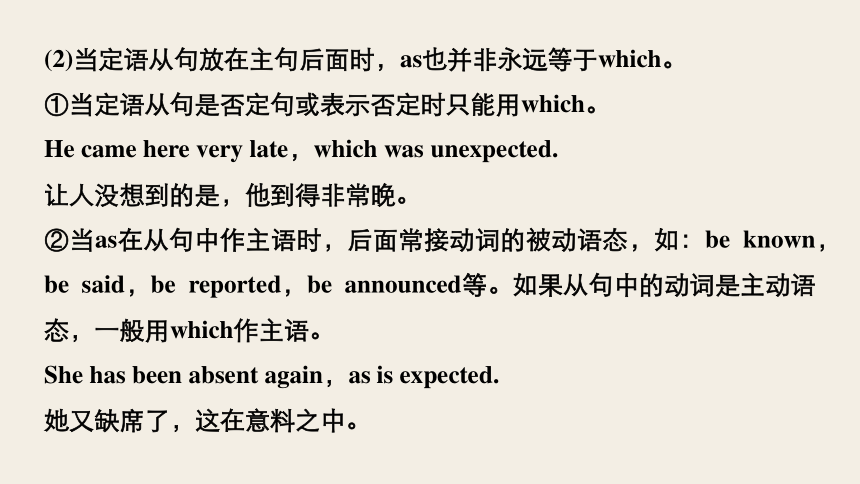
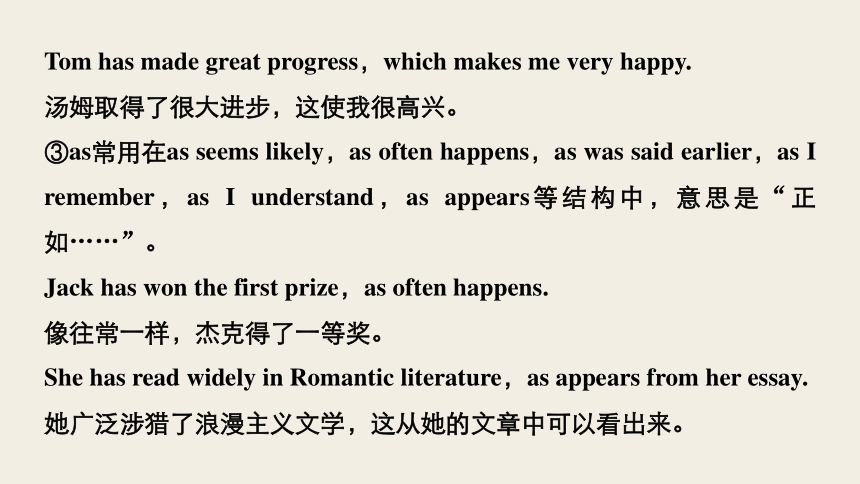
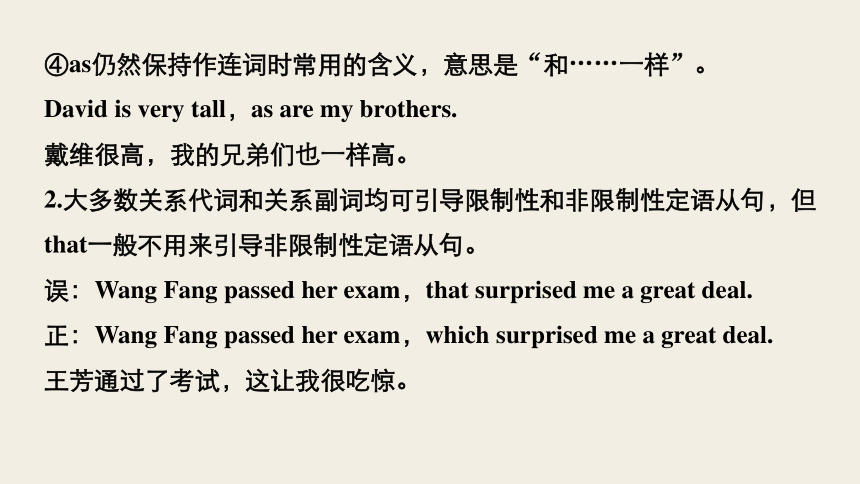
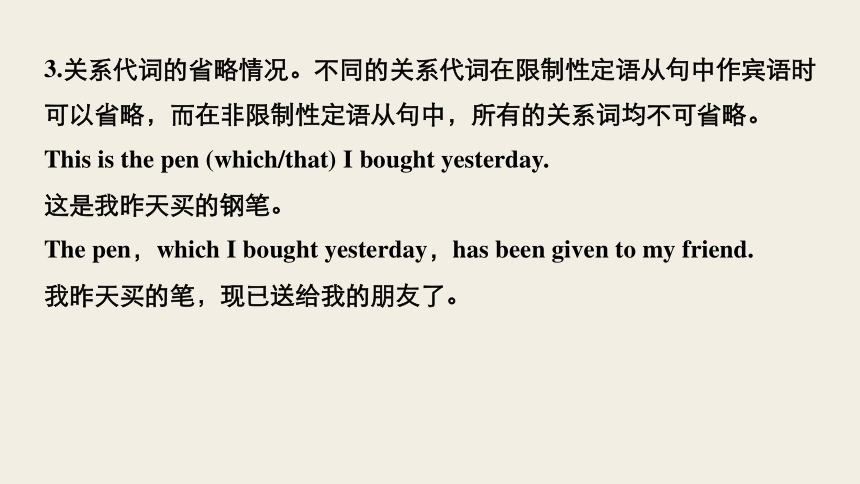
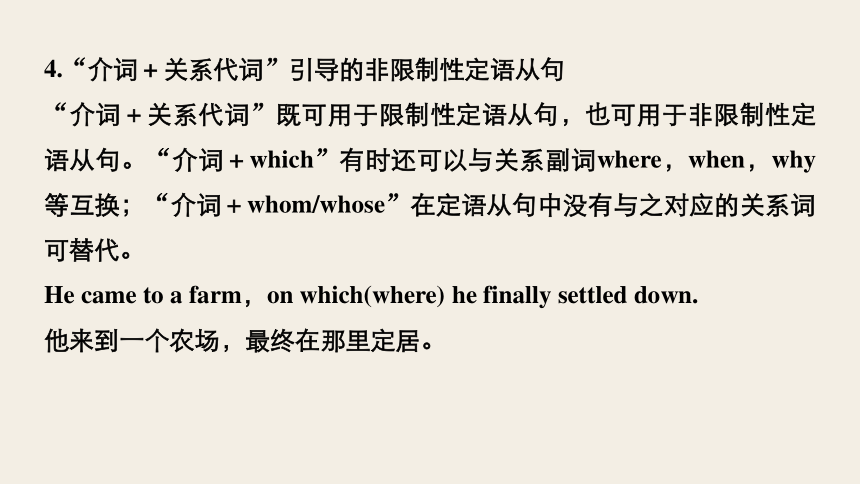
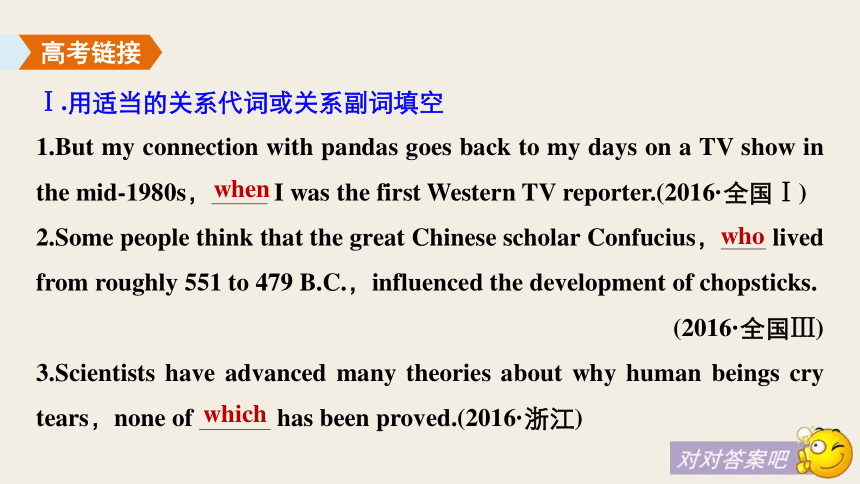
文档简介
课件35张PPT。Unit 5 Travelling abroad语法专题内容索引写作专题Period Three Grammar & Writing语法专题用适当的关系词填空
1.His mother, loves him very much,is strict with him.
2.Dorothy was always speaking highly of her role in the play, ,of course,made the others unhappy.
3.The month, I will be in my hometown,is drawing near.
4.By serving others,a person focuses on someone other than himself or herself, can be very eye--opening and rewarding.
5.Some pre--school children go to a day care centre, they learn simple games and songs.复习非限制性定语从句whowhichwhenwhichwhere一、非限制性定语从句的用法
非限制性定语从句与先行词的关系不十分密切,只是起补充说明的作用,缺少也不会影响全句的理解。在非限制性定语从句的前面往往有逗号与主句隔开,若将非限制性定语从句放在句子中间,前后都需要用逗号隔开。常见的引导词有:who,whom,which,as,whose,when,where。注意:that,why不用来引导非限制性定语从句。
The sun,which rises in the east,gives us heat and light.
太阳从东方升起,带给我们光和热。二、非限制性定语从句应注意的问题
1.关系代词as和which
(1)关系代词as既可引导限制性定语从句,也可引导非限制性定语从句,as在从句中作主语、宾语或表语。as引导非限制性定语从句,既可在主句前,又可在主句后,有时还可插入主句中;而which引导的非限制性定语从句只能置于主句之后。相同的是两者都可指代主句的整个内容。
As is known to everybody,the moon travels around the earth.
众所周知,月亮绕着地球转。
The weather turned out to be very good,which was more than we could expect.
出乎我们意料的是,天气变得非常好。(2)当定语从句放在主句后面时,as也并非永远等于which。
①当定语从句是否定句或表示否定时只能用which。
He came here very late,which was unexpected.
让人没想到的是,他到得非常晚。
②当as在从句中作主语时,后面常接动词的被动语态,如:be known,be said,be reported,be announced等。如果从句中的动词是主动语态,一般用which作主语。
She has been absent again,as is expected.
她又缺席了,这在意料之中。Tom has made great progress,which makes me very happy.
汤姆取得了很大进步,这使我很高兴。
③as常用在as seems likely,as often happens,as was said earlier,as I remember,as I understand,as appears等结构中,意思是“正如……”。
Jack has won the first prize,as often happens.
像往常一样,杰克得了一等奖。
She has read widely in Romantic literature,as appears from her essay.
她广泛涉猎了浪漫主义文学,这从她的文章中可以看出来。④as仍然保持作连词时常用的含义,意思是“和……一样”。
David is very tall,as are my brothers.
戴维很高,我的兄弟们也一样高。
2.大多数关系代词和关系副词均可引导限制性和非限制性定语从句,但that一般不用来引导非限制性定语从句。
误:Wang Fang passed her exam,that surprised me a great deal.
正:Wang Fang passed her exam,which surprised me a great deal.
王芳通过了考试,这让我很吃惊。3.关系代词的省略情况。不同的关系代词在限制性定语从句中作宾语时可以省略,而在非限制性定语从句中,所有的关系词均不可省略。
This is the pen (which/that) I bought yesterday.
这是我昨天买的钢笔。
The pen,which I bought yesterday,has been given to my friend.
我昨天买的笔,现已送给我的朋友了。4.“介词+关系代词”引导的非限制性定语从句
“介词+关系代词”既可用于限制性定语从句,也可用于非限制性定语从句。“介词+which”有时还可以与关系副词where,when,why等互换;“介词+whom/whose”在定语从句中没有与之对应的关系词可替代。
He came to a farm,on which(where) he finally settled down.
他来到一个农场,最终在那里定居。Ⅰ.用适当的关系代词或关系副词填空
1.But my connection with pandas goes back to my days on a TV show in the mid--1980s, I was the first Western TV reporter.(2016·全国Ⅰ)
2.Some people think that the great Chinese scholar Confucius, lived from roughly 551 to 479 B.C.,influenced the development of chopsticks.
(2016·全国Ⅲ)
3.Scientists have advanced many theories about why human beings cry tears,none of has been proved.(2016·浙江) whenwhowhich4.Many young people,most of were well-educated,headed for remote regions to chase their dreams.(2016·江苏)
5.We will put off the picnic in the park until next week, the weather may be better.(2016·天津)
6.It is a truly delightful place, looks the same as it must have done 100 years ago with its winding streets and pretty cottages.(2015·湖南)
7.The books on the desk, covers are shiny,are prizes for us.
(2015·四川)whomwhenwhichwhose8.He wrote many children’s books,nearly half of were published in the 1990s.(2015·重庆)
9.Opposite is St.Paul’s Church, you can hear some lovely music.
(2015·北京)
10.The number of smokers, is reported,has dropped by 17 percent in just one year.(2015·江苏)whichwhereasⅡ.单句改错(每小题仅有1处错误)
1.Having tea in the late afternoon provides a bridge between lunch and dinner,that might not be served until 8 o’clock at night.
(2013·新课标全国Ⅱ,短文改错)
2.There,Katia will introduce me to some of her friends,one of who has been to China several times.(2011·重庆,短文改错)whichwhom3.It turned out to be her own cup,that she’d left on the shelf by mistake.(2010·陕西,短文改错)
4.One day I saw a second--hand bicycle,that was only one hundred yuan.
(2009·辽宁,短文改错)whichwhich写作专题一般格式:英文书信的构成可分为6个部分:
信头(Heading)
收信人姓名及地址(Inside Name and Address)
称呼(Salutation)
正文(Body of the Letter)
结束语(Complimentary Close)
署名(Signature)Personal writing:letter to a penfriend1.信头(Heading)
信头是指发信人的单位名称或地址以及日期。格式如下:256 West Nanjing Street
Nanchang,Jiangxi Province
China
Sep.3rd,2017注意:写地址的次序与中文不同,应先写门牌号码、街道,然后城市和国名。日期的几种写法:
a.July 7,2017
b.1st October,2017
c.30 Nov.,2017
d.Sep.3rd,2017
特别注意英文书信日期应紧跟在写信人地址下一行,不能像写中文书信那样写在书信签名之后,这是很多学生的常见错误。2.收信人姓名及地址(Inside Name and Address)
写信人的地址和日期写好以后,接着就要写收信人的姓名和地址,这一项写在日期下一行的左上角。收信人姓名写一行,收信人地址可分两行或三行写,和写信人的地址一样,上下可取齐,也可向右缩进。在姓名前一般要加上称呼,称呼因人而异。66 Smith Street
Manchester
England
27th May,2017
Mr Jee Green
West Tenth Street
Hawaii
U.S.A.格式如下:3.称呼(Salutation)
称呼指的是信文开头的那种称呼,如Dear,Mr,Uncle,各种称呼因人而异。在称呼后面一般是用逗号,但也有用冒号的。
4.正文(Body of the Letter)
正文是信件的主体部分,也就是信的内容。正文应在称呼下两行开始。信的开头第一个字母通常和称呼开头第一个词平齐,也有往后退四个或八个字的。5.结束语(Complimentary Close)
结束语的一般写法如下:
Yours truly,
Truly yours,
Sincerely yours,
Yours sincerely,
6.署名(Signature)
下面是署名的例子:
Yours truly,
W.J.Watson1.Thanks for your letter...
2.I am writing to express my thanks for...
3.In this letter,I will tell you something about...
4.I would like to take this opportunity to express my apology to you...
5.I am writing to invite you to...
6.I wonder if you like to...
7.I hope you can make it.
8.I am looking forward to hearing from you.
9.Please let me know if you...
10.How do you think about...?(2017·河南省郸城一中高二月考)
假如你叫李平,你的美国笔友Tom来信询问你暑假过得怎样。请根据以下信息给他回信,说明你在假期中的活动和理由。注意:1.词数100左右;
2.信的开头和结尾已给出,不计入总词数。Step 1 审题谋篇
写作要求是介绍自己在暑假中的活动。写作时应注意下面几点:
1.确定文体:这是一篇记叙文。写作时注意记叙文的写作特点。
2.主体时态:文章应以一般过去时为主。
3.主体人称:由于介绍自己在暑假中的活动,所以应该以第一人称为主。写作步骤Step 2 联想词汇
1.首先 _____________________
2.因为 ___________________________________________
3.缺少睡眠 ___________
4.做家务 _________________
5.拓宽视野 _____________________
6.丰富知识 _____________________to begin with/firstly/firstas a result of/because of/due to/thanks to/owing tolack of sleepdo some houseworkbroaden one’s horizonsenrich one’s knowledgeStep 3 句式升级
1.告诉你我怎样过的暑假是件快乐的事情。
I’d like to tell you something about how I spent the summer holiday,
.(并列句)
something about how I spent the summer holiday.(it作形式主语)and it is a pleasure for meIt’s a pleasure to tell you2.另外,我花了两天时间和生活在乡下的爷爷奶奶在一起。
In addition,it took me two days to stay with my grandparents,____
.(定语从句)
In addition,it took me two days to stay with my grandparents _____
.(现在分词短语作后置定语)whowere living in the countrysidelivingin the countryside3.而且,为了欣赏大自然之美和呼吸新鲜空气,我和朋友去旅行了。
What’s more,I had a trip with my friends we can appreciate the beauty of nature and breathe fresh air.(目的状语从句)
What’s more,I had a trip with my friends the beauty of nature and breathe fresh air.(不定式作状语)so thatto appreciateStep 4 连句成篇
Dear Tom,
I’m more than glad to receive your letter.
And it’s a pleasure totell you something about how I spent the summer holiday.To begin with,I had a good rest because recently I often felt tired
as a result of my heavy study burden as well as lack of sleep and physical
exercise.In addition,it took me two days to stay with my grandparents
living in the countryside and help them do some housework and tell them
what happened to me and my friends. What’s more,I had a trip with
Yours,
Li Pingmy friends to appreciate the beauty of nature and breathe fresh air and the trip broadened my horizons and enriched my knowledge.
What did you do in your summer holidays? I’m looking forward
to hearing from you.
Best wishes!
本课结束
1.His mother, loves him very much,is strict with him.
2.Dorothy was always speaking highly of her role in the play, ,of course,made the others unhappy.
3.The month, I will be in my hometown,is drawing near.
4.By serving others,a person focuses on someone other than himself or herself, can be very eye--opening and rewarding.
5.Some pre--school children go to a day care centre, they learn simple games and songs.复习非限制性定语从句whowhichwhenwhichwhere一、非限制性定语从句的用法
非限制性定语从句与先行词的关系不十分密切,只是起补充说明的作用,缺少也不会影响全句的理解。在非限制性定语从句的前面往往有逗号与主句隔开,若将非限制性定语从句放在句子中间,前后都需要用逗号隔开。常见的引导词有:who,whom,which,as,whose,when,where。注意:that,why不用来引导非限制性定语从句。
The sun,which rises in the east,gives us heat and light.
太阳从东方升起,带给我们光和热。二、非限制性定语从句应注意的问题
1.关系代词as和which
(1)关系代词as既可引导限制性定语从句,也可引导非限制性定语从句,as在从句中作主语、宾语或表语。as引导非限制性定语从句,既可在主句前,又可在主句后,有时还可插入主句中;而which引导的非限制性定语从句只能置于主句之后。相同的是两者都可指代主句的整个内容。
As is known to everybody,the moon travels around the earth.
众所周知,月亮绕着地球转。
The weather turned out to be very good,which was more than we could expect.
出乎我们意料的是,天气变得非常好。(2)当定语从句放在主句后面时,as也并非永远等于which。
①当定语从句是否定句或表示否定时只能用which。
He came here very late,which was unexpected.
让人没想到的是,他到得非常晚。
②当as在从句中作主语时,后面常接动词的被动语态,如:be known,be said,be reported,be announced等。如果从句中的动词是主动语态,一般用which作主语。
She has been absent again,as is expected.
她又缺席了,这在意料之中。Tom has made great progress,which makes me very happy.
汤姆取得了很大进步,这使我很高兴。
③as常用在as seems likely,as often happens,as was said earlier,as I remember,as I understand,as appears等结构中,意思是“正如……”。
Jack has won the first prize,as often happens.
像往常一样,杰克得了一等奖。
She has read widely in Romantic literature,as appears from her essay.
她广泛涉猎了浪漫主义文学,这从她的文章中可以看出来。④as仍然保持作连词时常用的含义,意思是“和……一样”。
David is very tall,as are my brothers.
戴维很高,我的兄弟们也一样高。
2.大多数关系代词和关系副词均可引导限制性和非限制性定语从句,但that一般不用来引导非限制性定语从句。
误:Wang Fang passed her exam,that surprised me a great deal.
正:Wang Fang passed her exam,which surprised me a great deal.
王芳通过了考试,这让我很吃惊。3.关系代词的省略情况。不同的关系代词在限制性定语从句中作宾语时可以省略,而在非限制性定语从句中,所有的关系词均不可省略。
This is the pen (which/that) I bought yesterday.
这是我昨天买的钢笔。
The pen,which I bought yesterday,has been given to my friend.
我昨天买的笔,现已送给我的朋友了。4.“介词+关系代词”引导的非限制性定语从句
“介词+关系代词”既可用于限制性定语从句,也可用于非限制性定语从句。“介词+which”有时还可以与关系副词where,when,why等互换;“介词+whom/whose”在定语从句中没有与之对应的关系词可替代。
He came to a farm,on which(where) he finally settled down.
他来到一个农场,最终在那里定居。Ⅰ.用适当的关系代词或关系副词填空
1.But my connection with pandas goes back to my days on a TV show in the mid--1980s, I was the first Western TV reporter.(2016·全国Ⅰ)
2.Some people think that the great Chinese scholar Confucius, lived from roughly 551 to 479 B.C.,influenced the development of chopsticks.
(2016·全国Ⅲ)
3.Scientists have advanced many theories about why human beings cry tears,none of has been proved.(2016·浙江) whenwhowhich4.Many young people,most of were well-educated,headed for remote regions to chase their dreams.(2016·江苏)
5.We will put off the picnic in the park until next week, the weather may be better.(2016·天津)
6.It is a truly delightful place, looks the same as it must have done 100 years ago with its winding streets and pretty cottages.(2015·湖南)
7.The books on the desk, covers are shiny,are prizes for us.
(2015·四川)whomwhenwhichwhose8.He wrote many children’s books,nearly half of were published in the 1990s.(2015·重庆)
9.Opposite is St.Paul’s Church, you can hear some lovely music.
(2015·北京)
10.The number of smokers, is reported,has dropped by 17 percent in just one year.(2015·江苏)whichwhereasⅡ.单句改错(每小题仅有1处错误)
1.Having tea in the late afternoon provides a bridge between lunch and dinner,that might not be served until 8 o’clock at night.
(2013·新课标全国Ⅱ,短文改错)
2.There,Katia will introduce me to some of her friends,one of who has been to China several times.(2011·重庆,短文改错)whichwhom3.It turned out to be her own cup,that she’d left on the shelf by mistake.(2010·陕西,短文改错)
4.One day I saw a second--hand bicycle,that was only one hundred yuan.
(2009·辽宁,短文改错)whichwhich写作专题一般格式:英文书信的构成可分为6个部分:
信头(Heading)
收信人姓名及地址(Inside Name and Address)
称呼(Salutation)
正文(Body of the Letter)
结束语(Complimentary Close)
署名(Signature)Personal writing:letter to a penfriend1.信头(Heading)
信头是指发信人的单位名称或地址以及日期。格式如下:256 West Nanjing Street
Nanchang,Jiangxi Province
China
Sep.3rd,2017注意:写地址的次序与中文不同,应先写门牌号码、街道,然后城市和国名。日期的几种写法:
a.July 7,2017
b.1st October,2017
c.30 Nov.,2017
d.Sep.3rd,2017
特别注意英文书信日期应紧跟在写信人地址下一行,不能像写中文书信那样写在书信签名之后,这是很多学生的常见错误。2.收信人姓名及地址(Inside Name and Address)
写信人的地址和日期写好以后,接着就要写收信人的姓名和地址,这一项写在日期下一行的左上角。收信人姓名写一行,收信人地址可分两行或三行写,和写信人的地址一样,上下可取齐,也可向右缩进。在姓名前一般要加上称呼,称呼因人而异。66 Smith Street
Manchester
England
27th May,2017
Mr Jee Green
West Tenth Street
Hawaii
U.S.A.格式如下:3.称呼(Salutation)
称呼指的是信文开头的那种称呼,如Dear,Mr,Uncle,各种称呼因人而异。在称呼后面一般是用逗号,但也有用冒号的。
4.正文(Body of the Letter)
正文是信件的主体部分,也就是信的内容。正文应在称呼下两行开始。信的开头第一个字母通常和称呼开头第一个词平齐,也有往后退四个或八个字的。5.结束语(Complimentary Close)
结束语的一般写法如下:
Yours truly,
Truly yours,
Sincerely yours,
Yours sincerely,
6.署名(Signature)
下面是署名的例子:
Yours truly,
W.J.Watson1.Thanks for your letter...
2.I am writing to express my thanks for...
3.In this letter,I will tell you something about...
4.I would like to take this opportunity to express my apology to you...
5.I am writing to invite you to...
6.I wonder if you like to...
7.I hope you can make it.
8.I am looking forward to hearing from you.
9.Please let me know if you...
10.How do you think about...?(2017·河南省郸城一中高二月考)
假如你叫李平,你的美国笔友Tom来信询问你暑假过得怎样。请根据以下信息给他回信,说明你在假期中的活动和理由。注意:1.词数100左右;
2.信的开头和结尾已给出,不计入总词数。Step 1 审题谋篇
写作要求是介绍自己在暑假中的活动。写作时应注意下面几点:
1.确定文体:这是一篇记叙文。写作时注意记叙文的写作特点。
2.主体时态:文章应以一般过去时为主。
3.主体人称:由于介绍自己在暑假中的活动,所以应该以第一人称为主。写作步骤Step 2 联想词汇
1.首先 _____________________
2.因为 ___________________________________________
3.缺少睡眠 ___________
4.做家务 _________________
5.拓宽视野 _____________________
6.丰富知识 _____________________to begin with/firstly/firstas a result of/because of/due to/thanks to/owing tolack of sleepdo some houseworkbroaden one’s horizonsenrich one’s knowledgeStep 3 句式升级
1.告诉你我怎样过的暑假是件快乐的事情。
I’d like to tell you something about how I spent the summer holiday,
.(并列句)
something about how I spent the summer holiday.(it作形式主语)and it is a pleasure for meIt’s a pleasure to tell you2.另外,我花了两天时间和生活在乡下的爷爷奶奶在一起。
In addition,it took me two days to stay with my grandparents,____
.(定语从句)
In addition,it took me two days to stay with my grandparents _____
.(现在分词短语作后置定语)whowere living in the countrysidelivingin the countryside3.而且,为了欣赏大自然之美和呼吸新鲜空气,我和朋友去旅行了。
What’s more,I had a trip with my friends we can appreciate the beauty of nature and breathe fresh air.(目的状语从句)
What’s more,I had a trip with my friends the beauty of nature and breathe fresh air.(不定式作状语)so thatto appreciateStep 4 连句成篇
Dear Tom,
I’m more than glad to receive your letter.
And it’s a pleasure totell you something about how I spent the summer holiday.To begin with,I had a good rest because recently I often felt tired
as a result of my heavy study burden as well as lack of sleep and physical
exercise.In addition,it took me two days to stay with my grandparents
living in the countryside and help them do some housework and tell them
what happened to me and my friends. What’s more,I had a trip with
Yours,
Li Pingmy friends to appreciate the beauty of nature and breathe fresh air and the trip broadened my horizons and enriched my knowledge.
What did you do in your summer holidays? I’m looking forward
to hearing from you.
Best wishes!
本课结束
